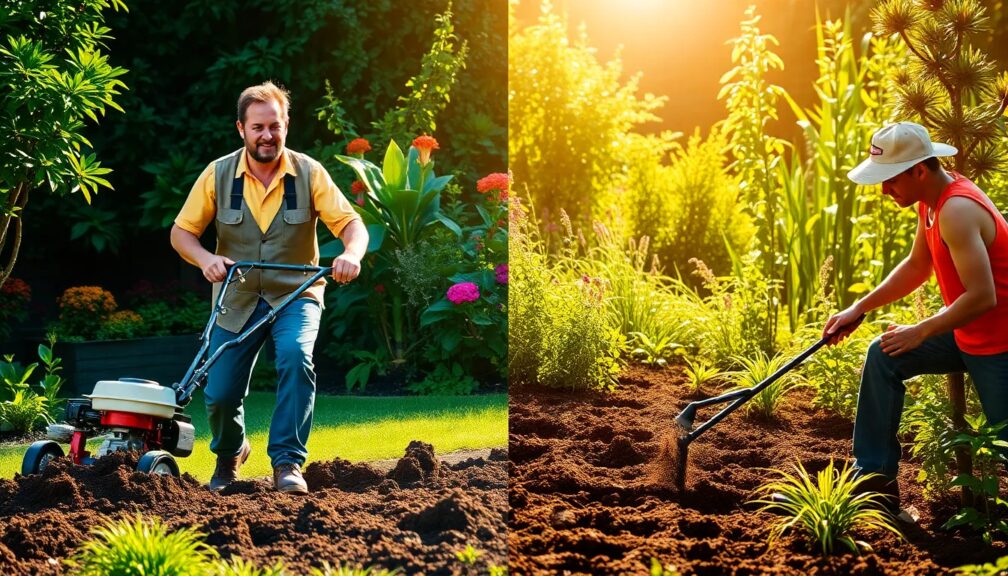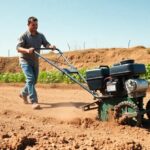What is better a tiller or cultivator

Welcome to Our Comprehensive Guide on Choosing Between a Tiller and a Cultivator
When venturing into the world of gardening and farming, the tools you choose can make all the difference in the ease and success of your endeavor. Among the essential tools for soil preparation are tillers and cultivators, each with its unique capabilities and uses. This guide is designed to help gardeners and farmers alike understand the functions and benefits of both tillers and cultivators, assisting you in making the best choice for your specific gardening needs. Whether you are preparing a new garden bed, maintaining an existing one, or just looking to enhance soil aeration, the decision between a tiller and a cultivator is crucial. Join us as we delve into the nuances of these powerful tools to determine which one is the superior choice for your gardening projects.
Should I use a tiller or cultivator?
Embarking on the journey to create the perfect garden, you may find yourself standing at the crossroads of decision, pondering a crucial question: which tool will be your trusty ally? As you envision the lush greenery and vibrant blooms, the choice between a tiller and a cultivator emerges as a pivotal one.
Imagine this: your garden, a canvas of soil, awaits the touch of a master to transform it into a verdant oasis. The secret to achieving this transformation lies beneath the surface, in the very roots and earth that will nurture your plants. Here's where the magic happens – a tiller can slice through hardened soil, turning it into a fine bed ready for planting. Its power and depth are unmatched, making it perfect for new plots or gardens that have not been tended to in ages.
But wait, there's more. If your garden is already established and requires a gentle touch to maintain its glory, a cultivator comes into play. This lightweight champion is designed for precision and care, perfect for weaving between rows, aerating the soil, and integrating compost or fertilizer. The cultivator's agility ensures your soil is treated like royalty, promising a flourishing garden that will be the envy of all.
Feel that tingling sensation? That's the fear of missing out on the full potential of your garden. Before you leap into action, pause and let the anticipation build. You’re on the brink of making a choice that will define your garden's future. Delve deeper into the world of tillers and cultivators, and uncover the secrets to unlocking the true bounty of the earth. Your dream garden is just around the corner, and the right tool is the key to that green paradise. Stay tuned, for the journey has just begun.
What are the disadvantages of a tiller?
Experienced gardeners know the value of a well-tilled soil, but behind the scenes, tillers carry a trove of hidden drawbacks that may make you reconsider their role in your gardening arsenal. Picture yourself ready to transform your garden, but before you make a move, it's crucial to weigh the pros and cons. Here, we reveal the lesser-known cons of tillers that could turn your garden dreams into toil and trouble.
Firstly, let's talk about physical strain. Maneuvering a tiller requires significant strength and stamina, often leading to back pain and muscle fatigue. And if you think the latest model will save you, think again; even with advancements, they demand a lot of your body. As you keep reading, you'll discover how this physical demand can put a damper on your gardening joy.
Another point of contention is the cost factor. High-quality tillers don't come cheap, and maintaining them adds to the financial burden. We've got the inside scoop on how these costs can add up over time, potentially throwing your budget off balance.
The environmental angle is also a cause for concern. Many tillers are powered by gas, emitting fumes that contribute to air pollution. The noise pollution is another factor that not only affects you but also disturbs the serenity of your neighborhood. Wait until you uncover the full extent of the environmental impact and why it might be time to rethink your approach to soil preparation.
Furthermore, tillers can adversely affect soil structure. Over-tilling can lead to soil compaction and disruption of the natural soil ecosystem, leading to a decline in soil health over time. The intricacies of how tillers can turn against the very soil they're meant to nurture are both fascinating and alarming.
Lastly, the risk of injury is ever-present. From flying debris to mechanical mishaps, tillers pose safety hazards that can turn a peaceful day in the garden into a trip to the emergency room. Learn about the precautions that are often overlooked and the startling statistics on tiller-related injuries.
Stay tuned to uncover the full implications of these disadvantages, and perhaps find out how you can mitigate them, or if there's a better alternative to achieve that perfect garden bed without the drawbacks of a traditional tiller. Your garden utopia might just depend on it.
How deep will a cultivator dig?
The depths to which a cultivator can plunge into the soil are as varied as the tools themselves. Unlocking the secrets beneath the surface, these powerful instruments are essential for preparing the land for planting. Imagine the transformation of compacted earth into a fertile bed ready to nurture seeds, the yield potential increasing substantially with each centimeter of depth.
1. Hand cultivators: Small yet mighty, they delve into the soil, typically up to a few inches, for delicate tasks and tighter spaces where precision is paramount.
2. Garden tillers: These medium-sized machines can reach depths of 8 to 10 inches, turning over soil efficiently, creating the perfect environment for root growth.
3. Tractor-pulled cultivators: For the ambitious grower, these beasts can reach depths of 12 inches or more, transforming vast fields into plant-ready landscapes.
But that's just scratching the surface. The intrigue lies in what happens when you adjust the tines, control the speed, and maneuver these tools with expertise. The results? A perfectly calibrated soil structure that can lead to an abundant harvest. Are you ready to discover the untapped potential of your land? The depths to which you can transform your soil may just be the key to unlocking an entirely new level of growth and productivity. The question is, can you afford not to explore this further?
When not to use a tiller?
Discover the hidden risks and missed opportunities that come with the indiscriminate use of a tiller. Imagine unlocking a deeper understanding of soil health and plant vitality that could take your gardening to the next level. Here's a glimpse of the crucial moments when reaching for that tiller might not be the best choice, and why bypassing it could be a game-changer for your garden's future.
- Soil structure at stake: Did you know that over-tilling can demolish the delicate web of life in your soil? Those earthworms and microorganisms are more than just underground dwellers; they're the unsung heroes of your garden's ecosystem.
- Timing is everything: Tempted to till when the soil is wet? Think again. This common misstep can lead to compaction and clumpy, hard-to-manage soil that could take seasons to recover.
- Seedbed sabotage: Dreaming of a flourishing garden? Overzealous tilling might be crushing those dreams by bringing dormant weed seeds to the surface and giving them a prime spot to sprout.
- Moisture management mishaps: Tilling can disrupt the natural moisture retention capabilities of your soil, leading to a thirsty garden that demands more water – and more of your attention.
If you're ready to explore the secrets of when to lay down the tiller and embrace alternative methods that can result in a more vibrant, resilient, and sustainable garden, keep reading. The journey to mastering the delicate dance with nature is filled with surprises that will not only enhance your green thumb but also leave you with a sense of awe for the intricate world beneath our feet. Say goodbye to the one-size-fits-all approach to gardening, and hello to a bespoke strategy that honors the unique rhythm of your land.
What is better a tiller or cultivator reddit
When it comes to preparing your garden for the season, you might feel overwhelmed by the choices out there. Some swear by the might of a tiller, while others profess the finesse of a cultivator. But have you ever wondered what seasoned gardeners and professional landscapers are saying on the popular forum Reddit? The discussion is as rich as the soil they toil in, and you're about to get a sneak peek into their treasure trove of insights.
Picture this: You're standing in your garden, the sun is shining, and you're ready to transform your space into a plant paradise. But there's a catch, the decision of whether to invest your time and money into a tiller or a cultivator could make or break the success of your harvest.
Before we delve into the Reddit verdict, let's quickly define the players in this gardening showdown. A tiller is the powerhouse, the heavy-duty machine that breaks new ground, churning up soil with deep-cutting blades. It's your go-to for starting fresh plots or when soil compaction is your nemesis. On the flip side, a cultivator is the precision artist, the lightweight contender that's perfect for stirring up soil, weeding around your delicate plants, and integrating compost into established beds.
Now, back to the virtual halls of Reddit where green thumbs and dirt-covered hands type away their experiences. The debate is lively, with some advocating for the brute force of a tiller, claiming nothing else will do when it comes to breaking through tough terrain. They share tales of tillers turning the most stubborn plots into fertile ground ready for planting.
But, hold on, before you make up your mind, there's another camp singing praises for cultivators. These garden enthusiasts highlight the ease of maneuvering, the gentle touch on the soil, and how cultivators encourage a thriving ecosystem beneath the surface. They post before-and-after pictures that could stir envy in the hearts of any garden lover.
Here's where it gets interesting, and where you might lean in closer. Some Reddit users offer a third way, a hybrid approach. They talk about starting with a tiller for that initial heavy lifting and then maintaining with a cultivator. Their success stories of bountiful gardens cultivated with such strategy could very well be the deciding factor for you.
In the end, it's not just about choosing a tool; it's about understanding the needs of your garden and matching it with the right equipment. The wisdom from Reddit is clear: knowing when and how to use a tiller or cultivator can elevate your gardening game to new heights.
Eager to know more? Tempted to join the discussion and discover the secret to a lush, vibrant garden? The answers lie within the Reddit threads, where a simple search could unlock a world of knowledge that's been right under your nose—or, should we say, right beneath your fingertips. So, what will it be for your garden this year—a tiller, a cultivator, or a masterful combination of both? The choice is yours, but remember, the clock is ticking as planting season approaches. Don't let indecision be the weed in your garden of dreams.
Consejo final: When deciding between a tiller and a cultivator, consider the specific needs of your garden. Use a tiller for heavy-duty tasks and initial soil preparation in larger areas. Opt for a cultivator for maintaining and aerating existing garden beds. Assess your garden's size and the nature of the tasks before making your choice. Wishing you a bountiful gardening experience!
 Can you plant vegetables without tilling
Can you plant vegetables without tilling Will a tiller break up hard soil
Will a tiller break up hard soil How do you till soil without a tiller
How do you till soil without a tiller Will a tiller work on hard soil
Will a tiller work on hard soil What is an alternative to tilling
What is an alternative to tillingIf you want to know more about similar articles like What is better a tiller or cultivator you can visit category Gardening Tools.
Deja una respuesta